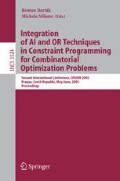Abstract
This paper presents a hybrid algorithm for a class of resource constrained scheduling problems based on decomposition. The general minimum completion time problem is considered, which has not been solved in a decomposed way by existing methods. The problem is first decomposed into an assignment master problem and a number of scheduling subproblems. The subproblem is formulated as both a constraint programming model and an integer programming model. The hybrid algorithm then combines constraint programming, integer programming and linear programming solvers in its three steps: the master problem solving, the subproblems solving and the cut generation. In particular, the cut generation method is based on the integer programming model, and in practice it is done by solving a linear program. Computational experiments have been carried out for the considered minimum completion time problems. The results show that the proposed algorithm could substantially reduce the solving time, compared with directly solving by mixed integer solvers.
Access this chapter
Tax calculation will be finalised at checkout
Purchases are for personal use only
Preview
Unable to display preview. Download preview PDF.
References
Baptiste, P., Le Pape, C., Nuijten, W.: Constraint-based Scheduling: Applying Constraint Programming to Scheduling Problems. Kluwer, Dordrecht (2001)
Benders, J.F.: Partitioning procedures for solving mixed-variables programming problems. Numerische Mathematik 4, 238–252 (1962)
Bockmayr, A., Pisaruk, N.: Detecting infeasibility and generating cuts for mip using cp. In: Proc.of CPAIOR 2003, Montreal, Canada (2003)
Chu, Y., Xia, Q.: Generating benders cuts for a general class of integer programming problems. In: Régin, J.-C., Rueher, M. (eds.) CPAIOR 2004. LNCS, vol. 3011, pp. 127–141. Springer, Heidelberg (2004)
Dash Inc. Dash XPRESS-MP 14.27 User’s Manual (2003)
El Sakkout, H., Wallace, M.: Probe backtrack search for minimal perturbation in dynamic scheduling. Constraints 5(4), 359–388 (2000)
Geoffrion, A.M.: Generalised benders decomposition. Journal of Optimization Theory and Application 10, 237–260 (1972)
Harjunkoski, I., Grossmann, I.E.: Decomposition techniques for multistage scheduling problems using mixed-integer and constraint programming methods. Comp. and Chem. Engineering 26, 1533–1552 (2002)
Hooker, J.N.: A hybrid method for planning and scheduling. In: Wallace, M. (ed.) CP 2004. LNCS, vol. 3258, pp. 305–316. Springer, Heidelberg (2004)
Hooker, J.N., Ottosson, G.: Logic-based benders decomposition. Mathematical Programming 96, 33–60 (2003)
Imperial College London. ECLiPSe 5.8 User’s Manual (2004)
Jain, V., Grossmann, I.E.: Algorithms for hybrid milp/cp models for a class of optimisation problems. INFORMS Journal on Computing 13, 258–276 (2001)
Sadykov, R.: A hybrid branch-and-cut algorithm for the one-machine scheduling problem. In: Régin, J.-C., Rueher, M. (eds.) CPAIOR 2004. LNCS, vol. 3011, pp. 409–415. Springer, Heidelberg (2004)
Thorsteinsson, E.S.: Branch-and-check: A hybrid framework integrating mixed integer programming and constraint logic programming. In: Walsh, T. (ed.) CP 2001. LNCS, vol. 2239, pp. 16–30. Springer, Heidelberg (2001)
Turkay, M., Grossmann, I.E.: Logic-based minlp algorithms for the optimal synthesis of process networks. Comp. and Chem. Engineering 20, 959–978 (1996)
Author information
Authors and Affiliations
Editor information
Editors and Affiliations
Rights and permissions
Copyright information
© 2005 Springer-Verlag Berlin Heidelberg
About this paper
Cite this paper
Chu, Y., Xia, Q. (2005). A Hybrid Algorithm for a Class of Resource Constrained Scheduling Problems. In: Barták, R., Milano, M. (eds) Integration of AI and OR Techniques in Constraint Programming for Combinatorial Optimization Problems. CPAIOR 2005. Lecture Notes in Computer Science, vol 3524. Springer, Berlin, Heidelberg. https://doi.org/10.1007/11493853_10
Download citation
DOI: https://doi.org/10.1007/11493853_10
Publisher Name: Springer, Berlin, Heidelberg
Print ISBN: 978-3-540-26152-0
Online ISBN: 978-3-540-32264-1
eBook Packages: Computer ScienceComputer Science (R0)

